formerly eScholarship Editions


|
|
|
|
Your request for similar items found 20 book(s). | Modify Search | Displaying 1 - 20 of 20 book(s) | |
| 1. | 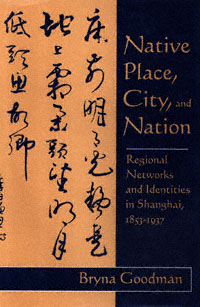 | Title: Native place, city, and nation: regional networks and identities in Shanghai, 1853-1937 Author: Goodman, Bryna 1955- Published: University of California Press, 1995 Subjects: History | Asian History | China | Urban Studies Publisher's Description: This book explores the role of native place associations in the development of modern Chinese urban society and the role of native-place identity in the development of urban nationalism. From the late nineteenth to the early twentieth century, sojourners from other provinces dominated the population of Shanghai and other expanding commercial Chinese cities. These immigrants formed native place associations beginning in the imperial period and persisting into the mid-twentieth century. Goodman examines the modernization of these associations and argues that under weak urban government, native place sentiment and organization flourished and had a profound effect on city life, social order and urban and national identity. [brief] Similar Items |
| 2. | 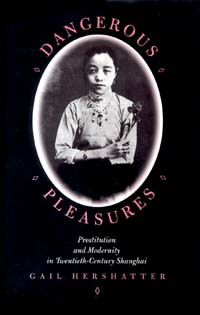 | Title: Dangerous pleasures: prostitution and modernity in twentieth-century Shanghai Author: Hershatter, Gail Published: University of California Press, 1997 Subjects: History | Women's Studies | China Publisher's Description: This pioneering work examines prostitution in Shanghai from the late nineteenth century to the present. Drawn mostly from the daughters and wives of the working poor and declassè elites, prostitutes in Shanghai were near the bottom of class and gender hierarchies. Yet they were central figures in Shanghai urban life, entering the historical record whenever others wanted to appreciate, castigate, count, regulate, cure, pathologize, warn about, rescue, eliminate, or deploy them as a symbol in a larger social panorama.Over the past century, prostitution has been understood in many ways: as a source of urbanized pleasures, a profession full of unscrupulous and greedy schemers, a changing site of work for women, a source of moral danger and physical disease, a marker of national decay, and a sign of modernity. For the Communist leadership of the 1950s, the elimination of prostitution symbolized China's emergence as a strong, healthy, and modern nation. In the past decade, as prostitution once again has become a recognized feature of Chinese society, it has been incorporated into a larger public discussion about what kind of modernity China should seek and what kind of sex and gender arrangements should characterize that modernity.Prostitutes, like every other non-elite group, did not record their own lives. How can sources generated by intense public argument about the "larger" meanings of prostitution be read for clues to those lives? Hershatter makes use of a broad range of materials: guidebooks to the pleasure quarters, collections of anecdotes about high-class courtesans, tabloid gossip columns, municipal regulations prohibiting street soliciting, police interrogations of streetwalkers and those accused of trafficking in women, newspaper reports on court cases involving both courtesans and streetwalkers, polemics by Chinese and foreign reformers, learned articles by Chinese scholars commenting on the world history of prostitution and analyzing its local causes, surveys by doctors and social workers on sexually transmitted disease in various Shanghai populations, relief agency records, fictionalized accounts of the scams and sufferings of prostitutes, memoirs by former courtesan house patrons, and interviews with former officials and reformers.Although a courtesan may never set pen to paper, we can infer a great deal about her strategizing and working of the system through the vast cautionary literature that tells her customers how not to be defrauded by her. Newspaper accounts of the arrests and brief court testimonies of Shanghai streetwalkers let us glimpse the way that prostitutes positioned themselves to get the most they could from the legal system. Without recourse to direct speech, Hershatter argues, these women have nevertheless left an audible trace. Central to this study is the investigation of how things are known and later remembered, and how, later still, they are simultaneously apprehended and reinvented by the historian. [brief] Similar Items |
| 3. | 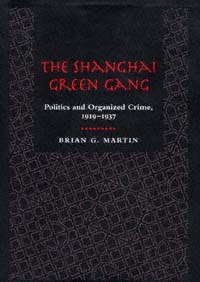 | Title: The Shanghai Green Gang: politics and organized crime, 1919-1937 Author: Martin, Brian G Published: University of California Press, 1996 Subjects: History | Asian History | China | Politics | Criminology Publisher's Description: In a remarkable example of history as detective work, Brian Martin pieces together the fascinating and complex story of the Shanghai Green Gang and its charismatic leader, Du Yuesheng. Martin sifts through a variety of fragmentary and at times contradictory evidence - from diplomatic dispatches to memoirs to police reports - to produce the most comprehensive account of this chaotic period of Chinese history. In analyzing the Green Gang's system of organized crime in Shanghai, the author broadens our understanding of a critical aspect of Chinese urban history and sheds light on the history of drug trafficking and organized crime worldwide.Martin argues that the Green Gang, the most powerful secret society in China during the first half of the twentieth century, was a resilient social organization that adapted successfully to the complex environment of a modernizing urban society. Illustrating its multilayered and complex relations with the bourgeoisie, the industrial proletariat, and the foreign and domestic political authorities, Martin demonstrates how these factors led to the Green Gang's absorption into the corporate state system after 1932. [brief] Similar Items |
| 4. | 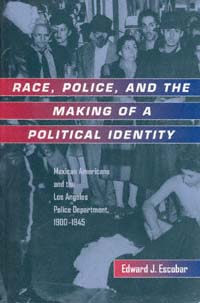 | Title: Race, police, and the making of a political identity: Mexican Americans and the Los Angeles Police Department, 1900-1945 Author: Escobar, Edward J 1946- Published: University of California Press, 1999 Subjects: History | California and the West | Latin American History | Latino Studies | Social Problems | Politics | Californian and Western History | Urban Studies | Criminology | Criminology Publisher's Description: In June 1943, the city of Los Angeles was wrenched apart by the worst rioting it had seen to that point in the twentieth century. Incited by sensational newspaper stories and the growing public hysteria over allegations of widespread Mexican American juvenile crime, scores of American servicemen, joined by civilians and even police officers, roamed the streets of the city in search of young Mexican American men and boys wearing a distinctive style of dress called a Zoot Suit. Once found, the Zoot Suiters were stripped of their clothes, beaten, and left in the street. Over 600 Mexican American youths were arrested. The riots threw a harsh light upon the deteriorating relationship between the Los Angeles Mexican American community and the Los Angeles Police Department in the 1940s.In this study, Edward J. Escobar examines the history of the relationship between the Los Angeles Police Department and the Mexican American community from the turn of the century to the era of the Zoot Suit Riots. Escobar shows the changes in the way police viewed Mexican Americans, increasingly characterizing them as a criminal element, and the corresponding assumption on the part of Mexican Americans that the police were a threat to their community. The broader implications of this relationship are, as Escobar demonstrates, the significance of the role of the police in suppressing labor unrest, the growing connection between ideas about race and criminality, changing public perceptions about Mexican Americans, and the rise of Mexican American political activism. [brief] Similar Items |
| 5. | 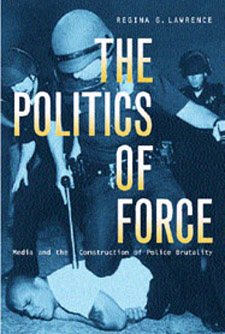 | Title: The politics of force: media and the construction of police brutality Author: Lawrence, Regina G 1961- Published: University of California Press, 2000 Subjects: Politics | Media Studies Publisher's Description: When police brutality becomes front-page news, it triggers a sudden, intense interaction between the media, the public, and the police. Regina Lawrence ably demonstrates how these news events provide the raw materials for looking at underlying problems in American society. Journalists, policy makers, and the public use such stories to define a problematic situation, and this process of problem definition gives the media a crucial role in our public policy debates. Lawrence extensively analyzes more than 500 incidents of police use-of-force covered by the New York Times and the Los Angeles Times from 1985 to 1994, with additional analysis of more recent incidents such as as the shooting of Amadou Diallo in New York. The incidents include but are not limited to those defined as "police brutality." Lawrence reveals the structural and cultural forces that both shape the news and allow police to define most use-of-force incidents, which occur in far greater numbers than are reported, she says. Lawrence explores the dilemma of obtaining critical media perspectives on policing policies. She examines the factors that made the coverage of the Rodney King beating so significant, particularly after the incident was captured on video. At the same time, she shows how an extraordinary news event involving the police can become a vehicle for marginalized social groups to gain entrance into the media arena. In contrasting "event-driven" problem definition with the more thoroughly studied "institutionally driven" news stories, Lawrence's book fills a major gap in media studies. It also offers a broader understanding of the interplay between the criminal justice system and the media in today's world. [brief] Similar Items |
| 6. | 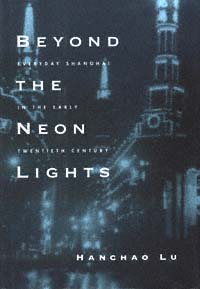 | Title: Beyond the neon lights: everyday Shanghai in the early twentieth century Author: Lu, Hanchao Published: University of California Press, 1999 Subjects: History | Sociology | China | Asian History | Urban Studies | Cultural Anthropology Publisher's Description: How did ordinary people live through the extraordinary changes that have swept across modern China? How did peasants transform themselves into urbanites? How did the citizens of Shanghai cope with the epic upheavals - revolution, war, and again revolution - that shook their lives? Even after decades of scholarship devoted to modern Chinese history, our understanding of the daily lives of the common people of China remains sketchy and incomplete. In this carefully researched study, Hanchao Lu weaves rich documentary data with ethnographic surveys and interviews to reconstruct the fabric of everyday life in China's largest and most complex city in the first half of this century. [brief] Similar Items |
| 7. | 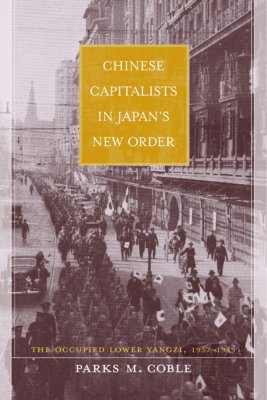 | Title: Chinese capitalists in Japan's new order: the occupied lower Yangzi, 1937-1945 Author: Coble, Parks M 1946- Published: University of California Press, 2003 Subjects: History | Asian History | China | Japan | Economics and Business Publisher's Description: In this probing and original study, Parks M. Coble examines the devastating impact of Japan's invasion and occupation of the lower Yangzi on China's emerging modern business community. Arguing that the war gravely weakened Chinese capitalists, Coble demonstrates that in occupied areas the activities of businessmen were closer to collaboration than to heroic resistance. He shows how the war left an important imprint on the structure and culture of Chinese business enterprise by encouraging those traits that had allowed it to survive in uncertain and dangerous times. Although historical memory emphasizes the entrepreneurs who followed the Nationalists armies to the interior, most Chinese businessmen remained in the lower Yangzi area. If they wished to retain any ownership of their enterprises, they were forced to collaborate with the Japanese and the Wang Jingwei regime in Nanjing. Characteristics of business in the decades prior to the war, including a preference for family firms and reluctance to become public corporations, distrust of government, opaqueness of business practices, and reliance of personal connections (guanxi) were critical to the survival of enterprises during the war and were reinforced by the war experience. Through consideration of the broader implications of the many responses to this complex era, Chinese Capitalists in Japan's New Order makes a substantial contribution to larger discussions of the dynamics of World War II and of Chinese business culture. [brief] Similar Items |
| 8. | 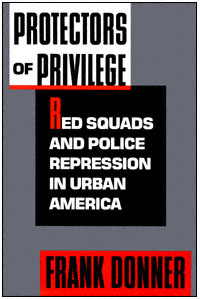 | Title: Protectors of privilege: red squads and police repression in urban America Author: Donner, Frank J Published: University of California Press, 1990 Subjects: American Studies | United States History | Urban Studies | Public Policy | Sociology Publisher's Description: This landmark exposé of the dark history of repressive police operations in American cities offers a richly detailed account of police misconduct and violations of protected freedoms over the past century. In an incisive examination of undercover work in Chicago, Los Angeles, New York, and Philadelp . . . [more] Similar Items |
| 9. | 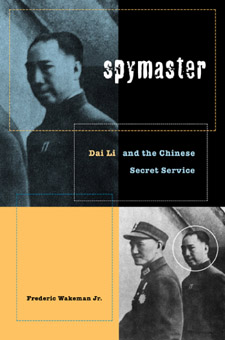 | Title: Spymaster: Dai Li and the Chinese secret service Author: Wakeman, Frederic E Published: University of California Press, 2003 Subjects: History | China | Asian History | Autobiographies and Biographies Publisher's Description: The most feared man in China, Dai Li, was chief of Chiang Kai-shek's secret service during World War II. This sweeping biography of "China's Himmler," based on recently opened intelligence archives, traces Dai's rise from obscurity as a rural hooligan and Green Gang blood-brother to commander of the paramilitary units of the Blue Shirts and of the dreaded Military Statistics Bureau: the world's largest spy and counterespionage organization of its time. In addition to exposing the inner workings of the secret police, whose death squads, kidnappings, torture, and omnipresent surveillance terrorized critics of the Nationalist regime, Dai Li's personal story opens a unique window on the clandestine history of China's Republican period. This study uncovers the origins of the Cold War in the interactions of Chinese and American special services operatives who cooperated with Dai Li in the resistance to the Japanese invasion in the 1930s and who laid the groundwork for an ongoing alliance against the Communists during the revolution that followed in the 1940s. Frederic Wakeman Jr. illustrates how the anti-Communist activities Dai Li led altered the balance of power within the Chinese Communist Party, setting the stage for Mao Zedong's rise to supremacy. He reveals a complex and remarkable personality that masked a dark presence in modern China - one that still pervades the secret services on both sides of the Taiwan Strait. Wakeman masterfully illuminates a previously little-understood world as he discloses the details of Chinese secret service trade-craft. Anyone interested in the development of modern espionage will be intrigued by Spymaster, which spells out in detail the ways in which the Chinese used their own traditional methods, in addition to adapting foreign ways, to create a modern intelligence service. [brief] Similar Items |
| 10. | 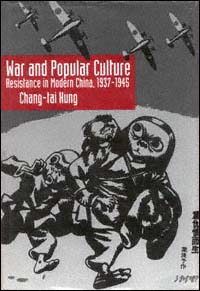 | Title: War and popular culture: resistance in modern China, 1937-1945 Author: Hung, Chang-tai 1949- Published: University of California Press, 1994 Subjects: History | Asian History | China Publisher's Description: This is the first comprehensive study of popular culture in twentieth-century China, and of its political impact during the Sino-Japanese War of 1937-1945 (known in China as "The War of Resistance against Japan"). Chang-tai Hung shows in compelling detail how Chinese resisters used a variety of popular cultural forms - especially dramas, cartoons, and newspapers - to reach out to the rural audience and galvanize support for the war cause. While the Nationalists used popular culture as a patriotic tool, the Communists refashioned it into a socialist propaganda instrument, creating lively symbols of peasant heroes and joyful images of village life under their rule. In the end, Hung argues, the Communists' use of popular culture contributed to their victory in revolution. [brief] Similar Items |
| 11. | 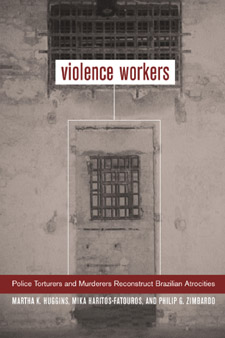 | Title: Violence workers: police torturers and murderers reconstruct Brazilian atrocities Author: Huggins, Martha Knisely 1944- Published: University of California Press, 2002 Subjects: Anthropology | Latin American Studies | Sociology Publisher's Description: Of the twenty-three Brazilian policemen interviewed in depth for this landmark study, fourteen were direct perpetrators of torture and murder during the three decades that included the 1964-1985 military regime. These "violence workers" and the other group of "atrocity facilitators" who had not, or claimed they had not, participated directly in the violence, help answer questions that haunt today's world: Why and how are ordinary men transformed into state torturers and murderers? How do atrocity perpetrators explain and justify their violence? What is the impact of their murderous deeds - on them, on their victims, and on society? What memories of their atrocities do they admit and which become public history? [brief] Similar Items |
| 12. | 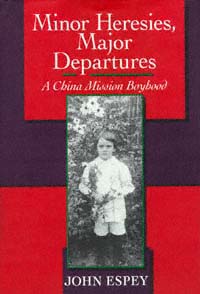 | Title: Minor heresies, major departures: a China mission boyhood Author: Espey, John Jenkins 1913- Published: University of California Press, 1994 Subjects: Asian Studies | China | Literature | Autobiographies and Biographies Publisher's Description: An American boy, son of Presbyterian missionaries, was born in Shanghai early in this century. The boy lived two lives, one within the pious church compound, the other along the canal and in the alleys of a traditional Chinese city. There he faced the alley brats' Lady Bandit, heard the shrill screams of a child's foot-binding, learned rank obscenities from passing boatmen, and, while still in short pants, chewed Sen-Sen and ogled snake-charmers in the old Native City. He sailed up the Yangtze to attend boarding school, and along with his Boy Scout patrol, met Chiang Kai-shek. And when John Espey grew up, he wrote about his years in China.This memoir is the story of those years, and while it is a wry, affectionate account, it also conveys an often overlooked picture of China in the years before communism. Seen through the eyes of a child, the interplay of religion, commerce, and American colonialism that took place during this period is revealed more tellingly - and more lightheartedly - than in many an analysis by an "old China hand."Espey's bent is to use a "Chinese" approach to his subject, that is, to hide a second meaning within his words, to speak in parables. This he learned from both his single-minded missionary father and the family's Chinese cook. The result is that the reader of Minor Heresies, Major Departures will learn a great deal about the Pacific Rim while having a rollicking good time. [brief] Similar Items |
| 13. | 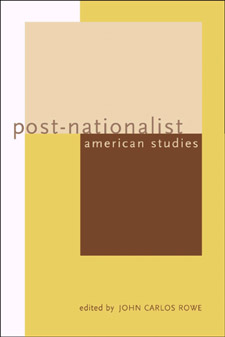 | Title: Post-nationalist American studies Author: Rowe, John Carlos Published: University of California Press, 2000 Subjects: American Studies | Ethnic Studies Publisher's Description: Post-Nationalist American Studies seeks to revise the cultural nationalism and celebratory American exceptionalism that tended to dominate American Studies in the Cold War era. The goal of the book's contributors is a less insular, more trans-national, comparative approach to American Studies, one that questions dominant American myths rather than canonizes them. Articulating new ways to think about American Studies, these essays demonstrate how diverse the field has become. Contributors are concerned with cross-cultural communication, race and gender, global and local identities, and the complex tensions between symbolic and political economies. Their essays explore, among other topics, the construction of "foreign" peoples and cultures; the notion of borders - territorial, racial, economic, and sexual; the "multilingual reality" of the United States; the place of the Mexican-American War in U.S. history; and the significance of Tiger Woods in today's global market of consumption. Together, the essays propose a renewed vision of the United States' role in the world and how American Studies scholarship can address that vision. Each contributor includes a sample syllabus showing how the issues discussed in individual essays can be brought into the classroom. [brief] Similar Items |
| 14. | 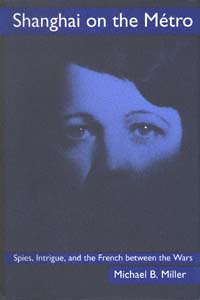 | Title: Shanghai on the Metro: spies, intrigue, and the French between the wars Author: Miller, Michael Barry 1945- Published: University of California Press, 1995 Subjects: History | European History | French Studies Publisher's Description: Secret agents, gun runners, White Russians, adventurers, and con men - they all play a part in Michael Miller's strikingly original study of interwar France. Based on extensive research in security files and a mass of printed sources, this book shows how a distinctive milieu of spies and spy literature emerged between the two world wars, reflecting the atmosphere and concerns of these years.Miller argues that French fascination with intrigue between the wars reveals a far more assured and playful national mood than historians have hitherto discerned in the final decades of the Third Republic. But the larger history set in motion by World War I and the subsequent reading of French history into global history are the true subjects of this work. Reconstituting through his own narratives the histories of interwar travel and adventure and the willful turning of contemporary affairs into a source of romance, Miller recovers the ambiance and special qualities of the age that produced its intrigues and its tales of spies. [brief] Similar Items |
| 15. | 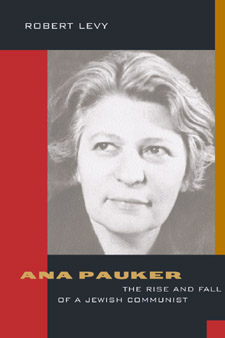 | Title: Ana Pauker: the rise and fall of a Jewish Communist Author: Levy, Robert 1957- Published: University of California Press, 2001 Subjects: History | Jewish Studies | Russian and Eastern European Studies | Politics | European History | Women's Studies Publisher's Description: In her own day, Ana Pauker was named "The Most Powerful Woman in the World" by Time magazine. Today, when she is remembered at all, she is thought of as the puppet of Soviet communism in Romania, blindly enforcing the most brutal and repressive Stalinist regime. Robert Levy's new biography changes the picture dramatically, revealing a woman of remarkable strength, dominated by conflict and contradiction far more than by dogmatism. Telling the story of Pauker's youth in an increasingly anti-Semitic environment, her commitment to a revolutionary career, and her rise in the Romanian Communist movement, Levy makes no attempt to whitewash Pauker's life and actions, but rather explores every contour of the complicated persona he found expressed in masses of newly accessible archival documents. [brief] Similar Items |
| 16. | 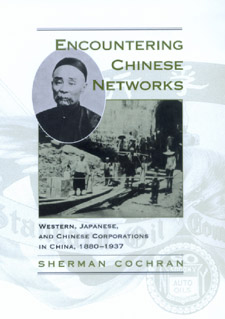 | Title: Encountering Chinese networks: Western, Japanese, and Chinese corporations in China, 1880-1937 Author: Cochran, Sherman 1940- Published: University of California Press, 2000 Subjects: History | Economics and Business | Asian History | China Publisher's Description: Big businesses have faced a persistent dilemma in China since the nineteenth century: how to retain control over corporate hierarchies while adapting to local social networks. Sherman Cochran, in the first study to compare Western, Japanese, and Chinese businesses in Chinese history, shows how various businesses have struggled with this issue as they have adjusted to dramatic changes in Chinese society, politics, and foreign affairs. Cochran devotes a chapter each to six of the biggest business ventures in China before the Communist revolution: two Western-owned companies, Standard Oil and British-American Tobacco Company; two Japanese-owned companies, Mitsui Trading Company and Naigai Cotton Company; and two Chinese-owned firms, Shenxin Cotton Mills and China Match Company. In each case, he notes the businesses' efforts to introduce corporate hierarchies for managing the distribution of goods and the organization of factory workers, and he describes their encounters with a variety of Chinese social networks: tenacious factions of English-speaking compradors and powerful trade associations of non-English-speaking merchants channeling goods into the marketplace; and small cliques of independent labor bosses and big gangs of underworld figures controlling workers in the factories. Drawing upon archival sources and individual interviews, Cochran describes the wide range of approaches that these businesses adopted to deal with Chinese social networks. Each business negotiated its own distinctive relationship with local networks, and as each business learned about marketing goods and managing factory workers in China, it adjusted this relationship. Sometimes it strengthened its hierarchical control over networks and sometimes it delegated authority to networks, but it could not afford to take networks for granted or regard them as static because they, in turn, took their own initiative and made their own adjustments. In this book Cochran calls into question the idea that the spread of capitalism has caused business organizations to converge over time. His cases bring to light numerous organizational forms used by Western, Japanese, and Chinese corporations in China's past, and his conclusions suggest that businesses have experimented with new forms on the basis of their historical experiences - especially their encounters with social networks. [brief] Similar Items |
| 17. | 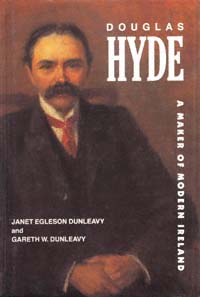 | Title: Douglas Hyde: a maker of modern Ireland Author: Dunleavy, Janet Egleson Published: University of California Press, 1991 Subjects: Literature | Autobiographies and Biographies | European History Publisher's Description: In 1938, at an age when most men are long retired, Douglas Hyde (1860-1949) was elected first president of modern Ireland. The unanimous choice of delegates from all political factions, he was no stranger to public life or to fame. Until now, however, there has been no full-scale biography of this important historical and literary figure.Known as a tireless nationalist, Hyde attracted attention on both sides of the Atlantic from a very early age. He was hailed by Yeats as a source of the Irish Literary Renaissance; earned international recognition for his contributions to the theory and methodology of folklore; joined Lady Gregory, W. B. Yeats, George Moore, and Edward Martyn in shaping an Irish theater; and as president of the Gaelic League worked for twenty-two years on behalf of Irish Ireland.Yet in spite of these and other accomplishments Hyde remained an enigmatic figure throughout his life. Why did he become an Irish nationalist? Why were his two terms as Irish Free State senator so curiously passive? Why, when he had threatened it earlier, did he oppose the use of physical force in 1916? How did he nevertheless retain the support of his countrymen and the trust and friendship of such a man as Eamon de Valera? Douglas Hyde: A Maker of Modern Ireland dispels for the first time the myths and misinformation that have obscured the private life of this extraordinary scholar and statesman. [brief] Similar Items |
| 18. | 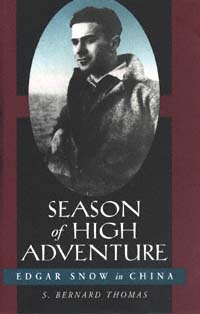 | Title: Season of high adventure: Edgar Snow in China Author: Thomas, S. Bernard 1921- Published: University of California Press, 1996 Subjects: History | China | Autobiographies and Biographies | Asian Studies Publisher's Description: In 1928, Edgar Snow (1905-1972) set out to see the world, hoping to make his mark as a travel-adventure writer. Shanghai was to be a mere stopover, but Snow stayed on in China for thirteen more years. The idealistic young Midwesterner became a journalist and ultimately developed close friendships with China's emerging revolutionary leaders. His 1938 classic, Red Star over China , strongly influenced American views of the Chinese Communists and is still in print nearly sixty years later.This biography breaks fresh ground with its unique and extensive use of Snow's diaries of over forty years. These writings convey Snow's private hopes and fears, his moods and motivations. Thomas skillfully links them with Snow's public writings and deeds. By recreating the milieu in which Snow worked in China, Thomas provides a clearer understanding of both the man and his times.Snow came to China devoid of any political agenda or sinological background. He returned home a politically astute China hand and famed journalist-author. His writing had taken on the nature of political action, which resulted in troubled soul-searching that Snow usually confined to his diary. Thomas's portrait of Ed Snow reveals a man caught up in an important historical moment, a man who profoundly influenced, and was influenced by, the events that swirled around him. [brief] Similar Items |
| 19. |  | Title: Good with their hands: boxers, bluesmen, and other characters from the Rust Belt Author: Rotella, Carlo 1964- Published: University of California Press, 2002 Subjects: History | American Studies | Sociology | Literature | Labor Studies | Urban Studies | Ethnic Studies | Gender Studies Publisher's Description: This eloquent, streetwise book is a paean to America's Rust Belt and a compelling exploration of four milieus caught up in a great transformation of city life. With loving attention to detail and a fine sense of historical context, Carlo Rotella explores women's boxing in Erie, Pennsylvania; Buddy Guy and the blues scene in Chicago; police work and crime stories in New York City, especially as they converged in the making of the movie The French Connection; and attempts at urban renewal in the classic mill city of Brockton, Massachusetts. Navigating through accrued layers of cultural, economic, and personal history, Rotella shows how stories of city life can be found in a boxing match, a guitar solo, a chase scene in a movie, or a landscape. The stories he tells dramatize the coming of the postindustrial era in places once defined by their factories, a sweeping set of changes that has remade the form and meaning of American urbanism. A native of the Rust Belt whose own life resonates with these stories, Rotella has gone to the home turfs of his characters, hanging out in boxing gyms and blues clubs, riding along with cops and moviemakers, discussing the future of Brockton with a visionary artist and a pitbull-fancying janitor who both plan to save the city's soul. These people make culture with their hands, and hands become an expressive metaphor for Rotella as he traces the links between their individual talents and the urban scenes in which they flourish. His writing elegantly connects what happens on the street to the larger story of urban transformation, especially the shift from a way of life that demanded individuals be "good with their hands" to one that depends on the intellectual and social skills fostered by formal education and service work. Strong feelings emerge in this book about what has been lost and gained in the long, slow aging-out of the industrial city. But Rotella's journey through the streets has its ultimate reward in discovering deep-rooted instances of what he calls "truth and beauty in the Rust Belt." [brief] Similar Items |
| 20. | 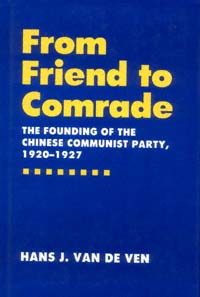 | Title: From friend to comrade: the founding of the Chinese Communist Party, 1920-1927 Author: Van de Ven, Hans J Published: University of California Press, 1992 Subjects: History | China | Politics Publisher's Description: Scholars have long held that the Chinese Communist Party (CCP) was a centralized organization from its founding in 1921. In a departure from that view, From Friend to Comrade demonstrates how the CCP began as a group of study societies, only evolving into a mass Marxist-Leninist party by 1927.Hans J. van de Ven's study is based on party documents of the 1920s that have only recently become available, as well as the writings of a wide range of Chinese communists. He analyzes the party's difficulty in building a cohesive organization firmly rooted in Chinese society. While past scholarship has emphasized the influence of Soviet communism on the CCP, van de Ven stresses the thinking and actions of Chinese communists themselves, placing their struggle in the context of China's political history and highly complex society. [brief] Similar Items |